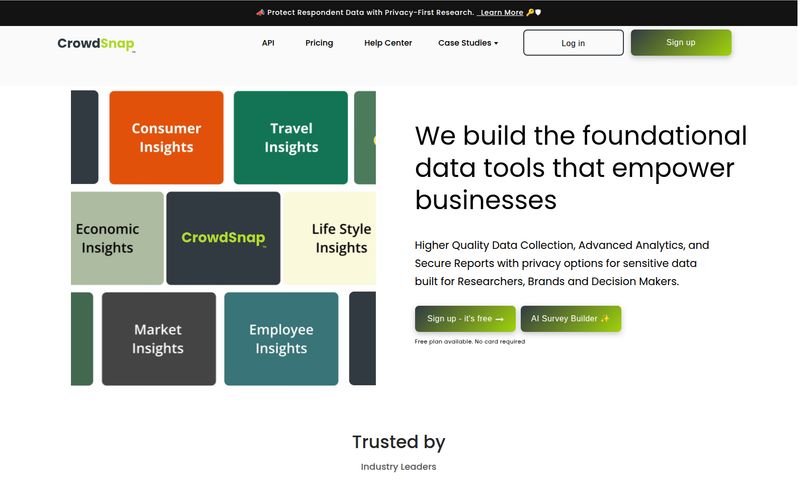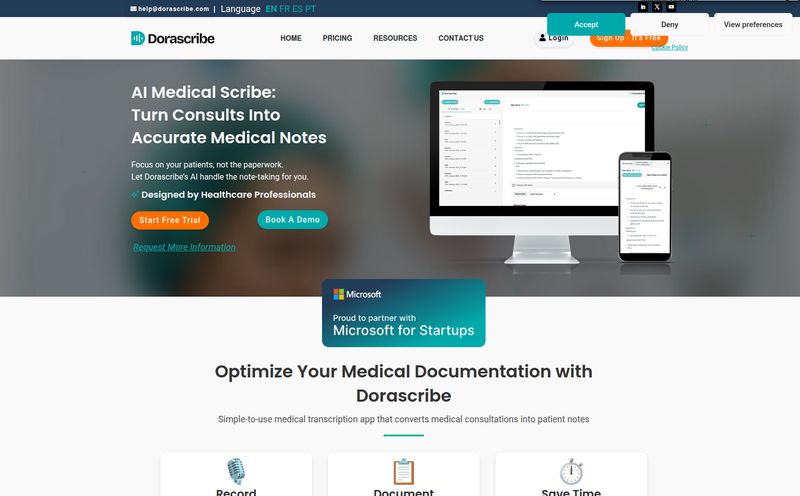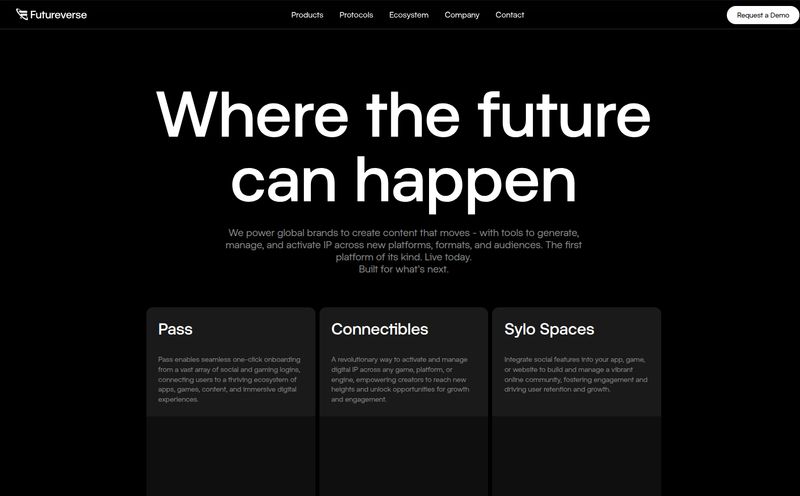I’ve been in the digital marketing and SEO world for more than a decade. I’ve seen platforms rise like rockets and fall like stones. We’ve gone from obsessing over keywords to obsessing over user intent, AI-generated content, and now... the blockchain. It’s a wild ride. Every so often, a tool pops up that makes me lean a little closer to my screen. Something that isn't just another analytics dashboard or a slightly-better-than-the-last-one content generator.
Today, that platform is Korus. It's making some pretty big promises, sitting right at the chaotic intersection of AI, music creation, and Web3. The pitch? An AI-powered music companion that lets you not just create and remix tracks, but actually own and manage your intellectual property on the blockchain. Yeah, it's a mouthful. But is it the future, or just a bunch of buzzwords in a trench coat?
What on Earth Is Korus, Anyway?
Let's break it down. At its heart, Korus is a playground for music lovers and creators. It uses artificial intelligence to help you play with, create, and remix music. The cool part is that it aims to do this with music from some big-name labels and IPs. So, instead of just messing with generic loops, you might get to deconstruct and rebuild something you actually know.
But that's just the shiny exterior. The real magic, or at least the most ambitious part, is what’s happening underneath. It’s all built on something called the KOR Protocol. This is where it gets a little nerdy, but stick with me.

Visit Korus
The KOR Protocol: The Engine Under the Hood
Think of the KOR Protocol as the new, decentralized rulebook for music IP. For years, artists have been fighting an uphill battle over royalties, ownership, and licensing. It’s a system that can feel… well, ancient. A tangled mess of contracts and middlemen. The KOR Protocol tries to slice through that mess with blockchain technology. By putting IP rights on a distributed ledger, it creates a transparent and, in theory, more equitable system for everyone involved. It’s like giving every musical stem, every remix, every creation its own digital passport.
This isn't just about protecting your own original song. It’s about creating a framework where you can safely collaborate, license your work to a game developer, or allow others to remix your track, all while the ownership and rules are baked right into the asset itself. It’s a bold move, and honestly its one I'm excited to watch.
Getting Hands-On: AI Creation and Interactive Music
Okay, so the backend is a heavy-duty blockchain operation. But what about the front end? What do you actually do? Korus markets itself as an "interactive music experience." This means AI tools designed to make music creation feel more like a game and less like staring at a complex digital audio workstation (DAW) like Ableton or Logic Pro.
You can remix existing tracks, create new assets, and participate in community quests. It’s this participation that fuels the ecosystem. Which brings me to the next piece of the puzzle…
What’s the Deal with the KOR Score?
To keep people engaged, Korus has a reward system built around something called the KOR Score. You earn points by being an active member of the community. Things like completing quests, creating cool assets with their tools, or developing products that use the KOR Protocol all contribute to your score. I see this as a clever bit of gamification. It's a way to incentivize the very actions the platform needs to grow: creation and collaboration. It turns passive users into active stakeholders. It's a bit like earning frequent flyer miles, but for your creative output. The more you fly, the more perks you get. The more you create, the more influence (and potentially, value) you build within the Korus world.
The Good, The Bad, and The Blockchain
No platform is perfect, especially one this new and ambitious. As an analyst, I have to look at both sides of the coin. It’s easy to get swept up in the hype.
The Upside: A Creator's Paradise?
The biggest win here is the focus on empowering creators. Decentralized IP management could genuinely change the game for independent artists. The thought of having secure, transparent, and direct control over your own work is a powerful motivator. The platform also promises to be a bridge between artists and developers, which could open up amazing new revenue streams for musicians in gaming, apps, and the metaverse. For me, the collaborative aspect is huge. Music has always been about community, and Korus seems to be building its foundation on that very idea.
Potential Hurdles to Consider
On the flip side, we have to be realistic. Korus is new. Gaining widespread adoption is a massive challenge for any platform, let alone one that involves the complexities of blockchain. And that’s the other big hurdle: blockchain and NFTs are still a bit of a black box for many people. There's a steep learning curve, and it can be intimidating. If Korus can't make that part feel seamless and invisible to the average user, it might struggle to break out of a niche Web3 audience. Also, a system like the KOR Score requires a thriving, active community to be meaningful. It’s a classic chicken-and-egg problem.
So, What's the Price Tag?
Here's the million-dollar question. As of my writing this, there's no clear pricing information available for Korus. This isn't uncommon for platforms in an early or beta stage. I’d speculate we might see a freemium model—basic creation tools for free, with fees for more advanced features, minting NFTs, or complex licensing transactions. Or maybe access will be tied to holding a certain amount of a native token. For now, we’ll have to wait and see. I'll be sure to update this article once that info becomes public.
Who Is Korus Really For?
After digging in, I think Korus is casting a wide net, but it will probably resonate most with a few key groups:
- Indie Musicians & Producers: Anyone tired of the old-school industry model and looking for more control over their IP.
- Tech-Savvy Creators: Artists who are already curious about or invested in the Web3 and NFT space.
- Game and App Developers: People who need a streamlined way to license authentic, high-quality music for their projects.
- Record Labels and IP Holders: Forward-thinking companies looking for new ways to monetize their back catalogs and engage with fans.
Frequently Asked Questions about Korus
- What is the KOR Protocol?
- The KOR Protocol is the decentralized, blockchain-based system that Korus is built on. It’s designed to manage intellectual property, making ownership and licensing for music transparent and secure.
- How does Korus protect my music IP?
- It uses blockchain technology and NFTs to create a permanent, verifiable record of ownership for musical assets. This means every piece of music, from a full song to a single drum loop, can have its ownership and usage rights encoded directly into it.
- Do I need to be a blockchain expert to use Korus?
- While the underlying tech is complex, Korus aims to make the user experience intuitive. The goal is for you to focus on creating music, not on managing crypto wallets. However, a basic understanding will probably be helpful, at least in the begining.
- Is Korus free to use?
- Pricing details haven't been released yet. It's possible there will be a free tier with options to pay for premium features or transactions on the blockchain.
- What is a KOR Score?
- KOR Score is a rewards system that tracks your participation and contributions to the Korus ecosystem. You earn points by creating music, completing quests, and engaging with the community, which could lead to various benefits on the platform.
- Can I really remix music from famous artists?
- That’s the promise. Korus is working to partner with iconic labels and IP holders to make their catalogs available for interactive use on the platform, all within a legal and rights-managed framework.
My Final Thoughts
So, is Korus the revolution it claims to be? The potential is definitely there. It’s ambitious, smart, and tackling a real, decades-old problem in the music industry. I love the combination of user-friendly AI tools on the front end and serious blockchain architecture on the back end.
Of course, execution is everything. It will all come down to user experience, community building, and getting those big-name IP holders on board. It’s a tightrope walk, but if they can pull it off, Korus might not just be a cool new tool—it could be a blueprint for a fairer, more creative, and more collaborative music industry. And that’s a tune I think we can all get behind.
References and Sources
For more general information on how blockchain is impacting the music industry, I'd recommend checking out reports from firms like Goldman Sachs on the music economy or articles from publications like CoinDesk that often cover music-related Web3 projects.



